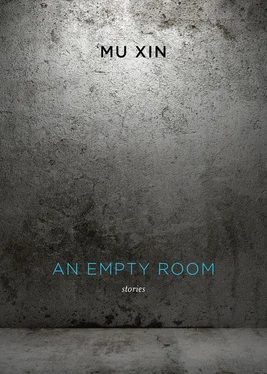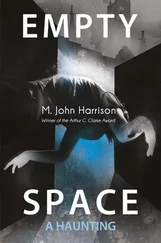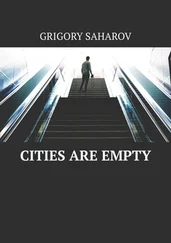Mu Xin - An Empty Room
Здесь есть возможность читать онлайн «Mu Xin - An Empty Room» весь текст электронной книги совершенно бесплатно (целиком полную версию без сокращений). В некоторых случаях можно слушать аудио, скачать через торрент в формате fb2 и присутствует краткое содержание. Год выпуска: 2011, Издательство: New Directions, Жанр: Современная проза, на английском языке. Описание произведения, (предисловие) а так же отзывы посетителей доступны на портале библиотеки ЛибКат.
- Название:An Empty Room
- Автор:
- Издательство:New Directions
- Жанр:
- Год:2011
- ISBN:нет данных
- Рейтинг книги:3 / 5. Голосов: 1
-
Избранное:Добавить в избранное
- Отзывы:
-
Ваша оценка:
- 60
- 1
- 2
- 3
- 4
- 5
An Empty Room: краткое содержание, описание и аннотация
Предлагаем к чтению аннотацию, описание, краткое содержание или предисловие (зависит от того, что написал сам автор книги «An Empty Room»). Если вы не нашли необходимую информацию о книге — напишите в комментариях, мы постараемся отыскать её.
In Our Time
An Empty Room
An Empty Room — читать онлайн бесплатно полную книгу (весь текст) целиком
Ниже представлен текст книги, разбитый по страницам. Система сохранения места последней прочитанной страницы, позволяет с удобством читать онлайн бесплатно книгу «An Empty Room», без необходимости каждый раз заново искать на чём Вы остановились. Поставьте закладку, и сможете в любой момент перейти на страницу, на которой закончили чтение.
Интервал:
Закладка:
Her voice grew in intensity. I listened without much comprehension, watching her high forehead and trying to think of a way to relax her so that we could talk more slowly, more meaningfully.
Her words didn’t stop: “Ten years is how long it has taken for me to return. . two children. . yes, boys. . it took me all these years to be able to return to Shanghai. . he didn’t come this time. . yes, he works in a food and goods co-op in Harbin and travels everywhere for supplies. . I’m the accountant of course. . very busy. . I’ll give you the address so do write me. . I went to the Musicians’ Congress. . sorry, Association. . the first thing that my brother and sister told me when I came home is that you are one of the three most prominent celebrities in Shanghai. . I also read it in the paper. . your name is often in the paper. . you don’t look old, still your former self. . how is it that you haven’t aged. . ten years. . more than ten years. . when I returned to Anhui, they didn’t want me anymore, so I tried Changchun then Shenyang, then finally settled down in Harbin. . my oldest child is eight, the younger one six. . my husband wants a girl, but I don’t. . my sister wanted to come with me, but I lied to her and said I was going to the train station. . ”
Tea was ready. She rose to take the cup before I could put it on the table. She sipped it like a northern peasant would sip it, sucking the water loudly. Then her voice continued:
“So you are one of the three most prominent celebrities. . yesterday, I went to the Association yesterday, and the guard at the gate gave me your address. Actually, I had looked for you there before and thought you had moved, or had died during the political campaign. . too many died. . I have moved around so much, spent six months in Dalian. . you don’t look old at all, you look the same, strange you don’t even have white hair. . the guard said that I should find you soon, that you are going abroad? England? France? Are you coming back? I doubt it. You aren’t old. . I wasn’t free yesterday and had to do some shopping today. . I’m leaving, too, so I had to find you tonight. I was worried even as I stepped through your doorway. . oh, tea, let me take that. .”
I tried to calm her down. Only if she was calm could she remember. I served some snacks with the tea, then brought out a few newly printed, signed musical scores and an album of personal photographs. I tried to prolong the intermission, hoping her thoughts would connect to the Fong Fong of the past, and thus to my own past self. The doorbell rang. Too many unexpected visitors. Three self-important men entered.
Fong Fong put away my gifts and with one gulp finished her tea.
“I shouldn’t bother you,” she said. “I’m leaving now. I’m so happy to have found you. I’m leaving. Please don’t get up.”
I asked for her address. She wrote it down while reading it out loud.
I followed her downstairs to the door. Her hands were rough and bony. She walked extremely fast. Before I could say anything, she disappeared into the crowded street. The road glistened with rain, though it had already stopped raining.
After the three visitors left, I read her address carefully in the light. I could see traces of her old handwriting that I imagined only my eyes could detect.
There would be another strange encounter. Not in the form of her person, but in the form of a letter.
“It was quite unexpected that I should see you again,” she wrote. “I thought you could never have survived the persecution. I thought that as soon as I returned home to Shanghai, my family would tell me about your death. I was shocked to hear you were still alive. You don’t even look old. I’m very happy for you. How difficult it must have been those long years. You mustn’t worry yourself as your life was saved. Your health is important.
“I decided to travel by ship to Dalian and connect to a train. It’s quieter and cheaper this way. I hadn’t seen the ocean for a long time. The Bohai Sea may not be the greatest sea but it’s still infinitely vast. I stood on deck, alone, looking at the blue ocean and the blue sky and the white sea gulls gliding along. I cried with regret, having left you so abruptly. It is much too late for regret, so my regret grows even more. I’ve cried nearly every day since then.
“Will you write to me when you are settled abroad? Thank you for the photographs, the ones of our good times in Beijing. Thank you also for the musical scores. I could even read some of them. You are a fine composer. I’m tempted to try them out on the piano.
“If you return to China in the future, please let me know. I simply would like to know and wouldn’t bother you. But if you ever come to Harbin, please don’t forget to visit my family.
“Take care of yourself when you’re in that foreign land! I wish you the best in everything!”
At the end of the letter she wrote out her full address again. It was astonishing that she who had become so worn and chatty could still write a letter like that. Her handwriting had declined. The paper was a crude kind of letterhead from their co-op.
I wrote to her before I left China, informing her of my date of departure and my country of destination. I didn’t say a word about our past as some things seem clearer if not openly clarified. I only wrote:
“I was also happy to see you again, and I thank you for thinking of me and wishing me well as you stood on deck before the sky and sea. I’ll certainly return, and will visit Harbin. I used to visit Harbin often. ‘Dao-li,’ inside the rails, is prettier than ‘Dao-wai,’ outside the rails. The Songhua River and Sun Island are utterly charming. Please tell your two lovely sons that an uncle wants to meet them and take them duck-hunting in the reed marshes.”
As I was busy attending farewell parties, packing, and preparing travel documents, Fong Fong’s letter calmed me. Our relationship was no longer about love.; it was no longer about virtue. It was simply the light of gratitude in the soul that refuses to die out. The agony of being an atheist is that in the moment you feel moved toward the divine, you simply cannot reach your hands up to God. So just as I was about to offer my hands up in gratitude I had to withdraw them and absorb the gratitude inside me. Nobody would be there to receive it anyway.
Another strange encounter. It arrived not in the form of a letter but in the form of the wind. After I had visited the Tower of London, I walked along the Thames with a heavy heart. As I watched the strong wind tear through people’s hair and clothes, a cold thought crossed my mind:
If I had died during the Catastrophe, if I had killed myself or had been killed, with my good name destroyed, what would Fong Fong have thought when she returned home and heard that from her family? Perhaps she would put on an it-has-nothing-to-do-with-me look, then pretend to let out a sigh of sympathy before assuming the it-has-nothing-to-do-with-me look again. She would secretly congratulate herself, “I was lucky to have left him in the first place. I was lucky not to have turned back. Otherwise, I would have been implicated. Even if I wasn’t killed, I would have suffered inconceivable consequences. I was smart and completely right in my choice. What a narrow escape!”
This uneasy thought followed me persistently. An old Chinese friend of mine had been a longtime resident of London. We could talk about anything together. He is a literary man, intelligent and kind-hearted, a devout humanist. We were both half drunk one night, and I told him about the four phases of Fong Fong, sparing no detail. I wanted to hear his thoughts about my uneasy encounter with the wind. Immediately after I finished the story, he exclaimed, “How could you have such thoughts!”
Читать дальшеИнтервал:
Закладка:
Похожие книги на «An Empty Room»
Представляем Вашему вниманию похожие книги на «An Empty Room» списком для выбора. Мы отобрали схожую по названию и смыслу литературу в надежде предоставить читателям больше вариантов отыскать новые, интересные, ещё непрочитанные произведения.
Обсуждение, отзывы о книге «An Empty Room» и просто собственные мнения читателей. Оставьте ваши комментарии, напишите, что Вы думаете о произведении, его смысле или главных героях. Укажите что конкретно понравилось, а что нет, и почему Вы так считаете.












